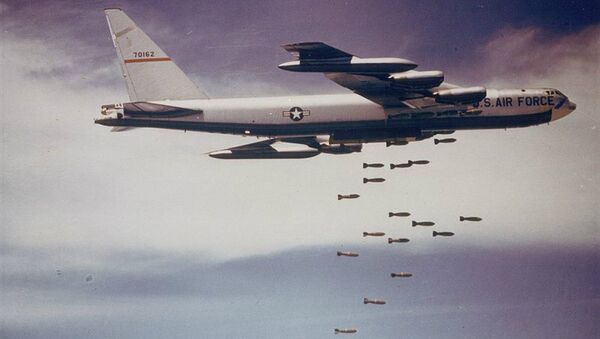The United States once again finds itself embroiled in what is shaping up to be a decades-long Middle East war described by US President Barack Obama as the “the long war, the endless war,” with violent fundamentalist extremists on the move throughout Syria, Iraq, and Libya. Washington-based neoconservatives banging the drums of battle are the harbingers for the next ground war, attempting to reestablish their oft-used “Clash of Civilizations” narrative.
In the pages of the mainstream media, the discredited plotters of the 2003 Iraq War, Project for a New American Century founders Bill Kristol and Robert Kagan, again point to Samuel Huntington’s narrative of a Western clash against the savages of the Middle East. Weakly rebranding, the PNAC returns as the Center for a New American Security, CNAS providing the same racist diatribe, and using war as the end game.
CNAS, combined with another Kristol-Kagan brainchild called the Foreign Policy Initiative, are a “go-to think tank on military affairs” under the Obama Administration, according to the Washington Post. The organization looks to serve prominently in a Hillary Clinton White House, as evidenced by the former Secretary of State’s appearance as the keynote speaker at the group’s 2007 opening.
Surprisingly, one of the leading forces against Obama’s so-called long war is the candidate decried by the Clinton camp, and most of the rest of the world, as a “loose cannon.” It’s Donald Trump, a man who can hardly be accused of being a candidate for racial tolerance, particularly regarding the Middle East. Last week, responding to ongoing calls for war, the presumptive Republican nominee said of Kristol, “This poor guy, all he wants to do is go to war and kill people.”
Kristol, however, continues to search for a conservative third-party candidate to undermine Trump’s electoral bid, in an effort to either secure the presidency for the hawkish Clinton or, in a fantastic scenario, to prevent either candidate from receiving the requisite 270 Electoral College votes necessary, leaving the choice to the Republican House of Representatives.
The hawks of yesteryear once again garner an audience within the Beltway echo chamber for their age-old bigoted rhetoric, predicated on the inferiority of the Arab people as a reason for a Western guiding hand to civilize the unwashed masses.
Loud & Clear’s Brian Becker asked former US Marine and anti-war activist Michael Prysner about how racism was used to motivate combat soldiers in Iraq and what it portends for the future.
"Yes, absolutely," Prysner said. "Not only was there a lot of racism, but racism became the primary tool of our officers and politicians who set up the war to convince service members that they should go and risk their lives."
"Look, it was true in Korea, it was true in Vietnam, and it is true today as we send more troops back to Iraq and as we continue to send soldiers to Afghanistan," explained Prysner. "Racism is accepted throughout the chain of command as not only part of the job, but as the motivating factor that we were supposed to have to invade."
"I was in the Army right before the 9/11 attacks," Prysner told Sputnik. "It was a very different military from a cultural perspective than it was right after the 9/11 attacks when our commanders and politicians realized that they were going to start sending us to a war like we haven’t seen in some time."
"Very quickly after the 9/11 attacks, all of these racist terms that I had never heard in my life for Arab and Muslim people all of a sudden became part of the lexicon, became part of the chants we would do when we were running, became part of the speeches our officers would give when we were in formation," he explained.
"We were being inundated with the concept of the clash of civilizations. Inundated with these ideas that we needed revenge on these other types of people who are savages, as they said, and so the only thing that was in the heads of those who were told to go was this extreme racist characterization of the people of Iraq and Afghanistan and wherever they decided to send us."
Prysner explained that these racial narratives fractured upon troops meeting people in Iraq.
"The lies were exposed when we came face to face with the Iraqi people and we saw such degrees of commonality with these people who we were occupying as opposed to these rich people who were sending us to war and propagating racist ideologies," remembered Prysner.
"All of that racist inundation that they pump into us before we go to war only lasts so long," he said. "The reality is that we are going to come home and live the rest of our lives thinking about what we took part in, and so many people have had to come home and face the fact that we weren’t liberators, we didn’t do a heroic mission that saved a bunch of people, we were instead part of a horrific occupation that completely ripped to shreds a country."





